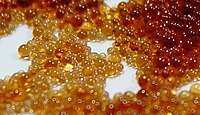
Photo from wikipedia
Lithium compounds are of high interest to many industries. The presence of undesirable impurities in Li precursors leads to uncontrolled change in the functional properties of final compounds. Therefore, the… Click to show full abstract
Lithium compounds are of high interest to many industries. The presence of undesirable impurities in Li precursors leads to uncontrolled change in the functional properties of final compounds. Therefore, the development of reliable methods for lithium salt purification is considered a key factor for their application in various industries. This work focuses on the application of a titanium phosphate ion exchanger (Li-TiOP) toward Cu2+, Co2+, Mn2+, Ni2+, and Cr3+ ions in the purification of a saturated LiNO3 solution. The sorption kinetics of the selected ions, considering external and internal mass transfer, as well as chemical interaction, were deeply studied. The kinetic study showed that the values of intraparticle diffusion rate and effective diffusion coefficients for the studied ions decreased in the following order: Cr(III) ˃ Cu(II) Mn(II) ˃ Co(II) ˃ Ni(II). For all the selected ions, chemical interaction was described with a pseudo-second-order reaction model. The sorption kinetics were controlled by the size of the solvated metal ion, its effective charge, the electronic structure of the adsorbed ion, and the interaction with the functional groups of the sorbent. Due to fast kinetics, the high degree of removal of trace quantities of the impurities this material gives it consideration as a promising sorbent for the deep purification of lithium salts.
Journal Title: International Journal of Molecular Sciences
Year Published: 2022
Link to full text (if available)
Share on Social Media: Sign Up to like & get
recommendations!